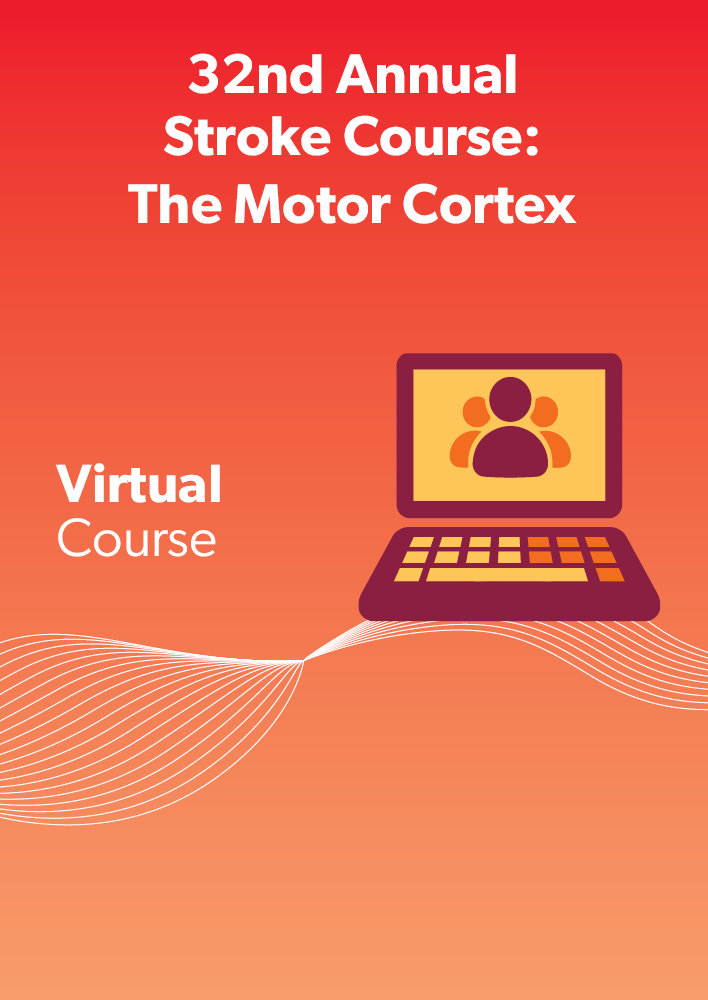
32nd Annual Stroke Course: The Motor Cortex
- Early bird registration rate available through 3/16/2026. After, $500
DESCRIPTION
This two-day course offers an in-depth, interdisciplinary exploration of the motor cortex, focusing on its role in whole-body motor function. Learners will investigate the neural networks and connections within the motor cortex that contribute to motor planning and execution deficits following a stroke. The course integrates cognitive and physical perspectives, linking memory, motor control and coordination to equip rehabilitation professionals with the knowledge and practical skills to address spasticity, motor neglect and apraxia. Learners will also be introduced to the Rehabilitation Treatment Specification System (RTSS) as a method for clearly defining and tailoring rehabilitation interventions. Breakout sessions will provide opportunities to apply the RTSS framework to real-world clinical scenarios involving motor deficits. Finally, the course will emphasize a patient-centered approach, considering individualized outcomes as well as the emotional and psychological aspects of stroke recovery.
AUDIENCE
Advanced Practice Nurses, Nurses, Occupational Therapists, Occupational Therapy Assistants, Physical Therapists, Physical Therapist Assistants, Speech-language Pathologists, Physicians and Physician Assistants.
SUCCESSFUL COMPLETION
To successfully complete this course, participants will need to attend the live activity, complete all self-study work, attest to your attendance and complete an evaluation at the conclusion of the course through the Academy Learning Portal. Self-study work will be available on April 2, 2026. All course work, including self-study work and online evaluation, must be completed by May 8, 2026. Learners will have access to the course materials for review until July 30, 2026 at 12 AM GMT.
LEARNER OUTCOMES
Upon completion of this course, participants will be able to:
- Describe physical and cognitive deficits that are the result of a stroke in the motor cortex and their functional impact in return to independence.
- Identify how Rehabilitation Treatment Specification System (RTSS) targets, ingredients and mechanisms of action of skill-based training can be utilized to drive improved clinical decision making and patient outcomes.
- Analyze principles and frameworks of motor learning for intervention selection and individualized goal setting for patients who have had a stroke.
- Summarize how interprofessional collaboration and lived experience shape effective behavioral, equipment and environmental decisions in disability adjustment.
COURSE FACULTY
Additional course faculty listed in the brochure*
- Richard L. Harvey, MD
- Cheri Marvel, PhD
- Mariana Mendes Bahia, PhD, CCC-SLP
- Peii (Peggy) Chen, PhD
- Allison DeLillo, PT, DPT, NCS
- Leanna Katz, OTD, OTR
- Cedrick McKoy, MSN, APN
- Candice Osborne, PhD, MPH, OTR
- Paige Salinas, MS, MHA, LCSW, CBIST-AP
- Katie Strong, PhD, CCC-SLP
- Alexandra Terrill, PhD
CONTINUING EDUCATION CREDIT:
Occupational Therapy:
 Shirley Ryan AbilityLab is an AOTA Approved Provider of professional development. Course approval ID# 14711. This Blended/Hybrid course is offered at 12.5 contact hours, 1.25 CEUs [intermediate level, foundational knowledge/OT service delivery]. The assignment of AOTA CEUs does not imply endorsement of specific course content, products, or clinical procedures by AOTA.
Shirley Ryan AbilityLab is an AOTA Approved Provider of professional development. Course approval ID# 14711. This Blended/Hybrid course is offered at 12.5 contact hours, 1.25 CEUs [intermediate level, foundational knowledge/OT service delivery]. The assignment of AOTA CEUs does not imply endorsement of specific course content, products, or clinical procedures by AOTA. Physical Therapy: This online course has been approved by the Illinois Physical Therapy Board for 12.5 contact hours (11.5 live, 1 self-study). Approval #216-000069
The Shirley Ryan AbilityLab is recognized by the California and New York State Education Department's State Board for Physical Therapy as an approved provider of physical therapy and physical therapist assistant continuing education. This course has been approved for 12.5 contact hours (11.5 live, 1 self-study) on 11/4/2025.
Many states accept continuing education contact hours recognized in other states, enabling professionals to use these hours to meet their licensing or certification requirements. Please consult your state regulations to see if this meets CEU requirements for your license.
